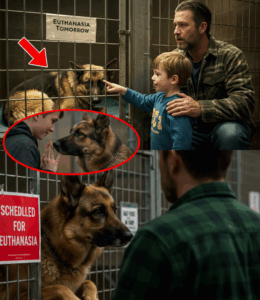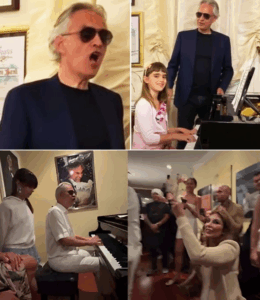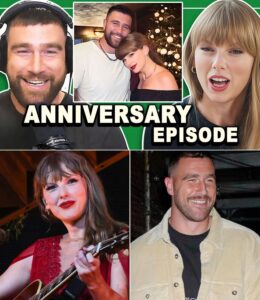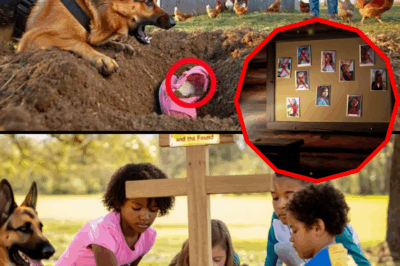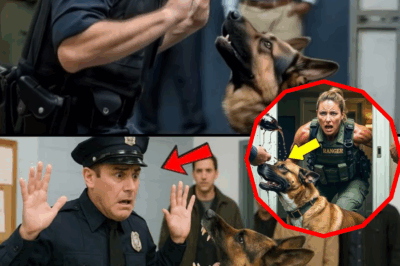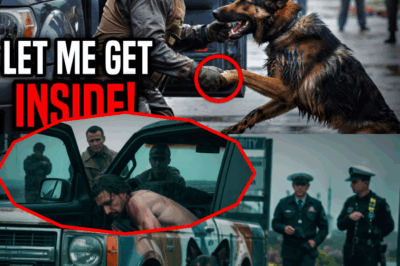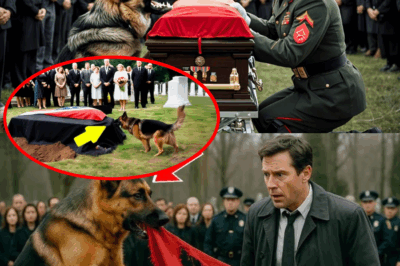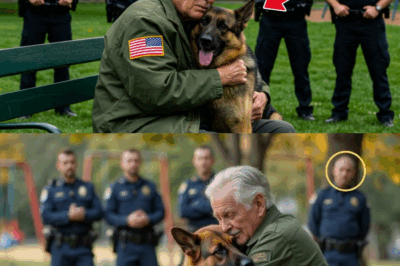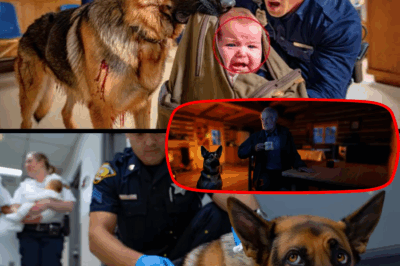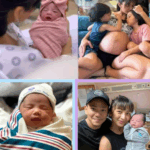German Shepherd Was About to Be Euthanized—But Then a Child Pointed and Said “That One”
In the cold and bleach-scented hallway of a crowded animal shelter, fate held its breath. Rows of wagging tails and pleading eyes lined the cages, all vying for the briefest hint of affection. At the farthest end, tucked deep in the shadows where no eager volunteers ventured, a battered German Shepherd lay almost motionless. With unkempt fur, a useless hind leg, and a label that might as well scream “hopeless,” the only thing more broken than his body was his spirit.
The shelter staff called him Ranger. For seven years, life had only taught Ranger pain and disappointment. Three failed adoptions, each ending with his return—every time with a little less hope in his eyes. The note on his cage was clear: Euthanasia scheduled: tomorrow.

Nobody looked twice, nobody cared. That is, until Caleb Whitmore—reluctant single father, widowed and hollowed by his own grief—arrived that morning with his six-year-old son, Ryan. If grief was water, their home had long been drowning. Caleb told himself this trip to the shelter was just a distraction, a way to get Ryan out of his nearly catatonic silence. Since losing his mother, Ryan hadn’t spoken a word in nearly a year.
As the adoption event buzzed around them with laughter and life, Ryan drifted through the aisles like a ghost. He showed no interest in the playful beagle puppies or the fluffy kittens that caused other children to squeal. While other kids begged for the “cutest,” “happiest” dog, Ryan’s feet dragged him deeper into the neglected corners, as if led by some invisible compass.
And there, standing before Ranger’s cage, Ryan stopped. He stared, unblinking, into the dog’s tired eyes. The silence between them was thick with unspoken stories. Then, without a sound, Ryan raised his finger and pointed: “That one.”
At first, Caleb thought Ryan was mistaken. “That one?” he gently urged, torn by shock. Ryan nodded, then whispered something that pierced through months of agony: “Please.”
It was the first word he’d spoken since the funeral, and it rang through the sterile shelter louder than any shout. Stunned, Caleb flagged down a volunteer. The staff’s hesitation was immediate—Ranger wasn’t part of the event, wasn’t considered adoptable, wasn’t even being shown anymore. When asked if they understood the risks, that Ranger was “damaged” and often snapped at strangers, Caleb replied with equal candor: “So are we.”
They signed the waivers. There was no triumphant music, no cinematic rescue—only a fragile hope, and the beginning of something neither of them could name.

As Ranger took his first shaky steps out of the cage, Ryan was right by his side. The dog, who had cowered from every previous hand, leaned into Ryan’s touch. Driving home, Caleb kept checking the mirror—Ryan’s hand never left the dog’s mottled fur, as if they’d always belonged to each other.
The first night didn’t bring instant healing. Ranger paced, unsure, tracing the walls with nervous, lopsided circles. Yet, Ryan never flinched. He fetched a cartoon blanket, laid it next to the dog, and curled up in silence—no words needed. By morning, they had fallen asleep wrapped around each other—a scared boy and the dog nobody wanted.
The days that followed were filled with tiny miracles. The vet said the leg could be repaired, though it would cost more than Caleb had. But “healing” began long before any surgery. Ryan began drawing again—sketches of him and Ranger, always together, always brave. The boy, who once shrank from the world, started humming tunes and helping at the dinner table. Where there had been silence, now there was gentle laughter.
Ranger, too, transformed. The haunted dog learned to eat, sleep, even play again. Loud noises still startled him, but Ryan’s presence calmed him more than medicine ever could. It was as if they shared the same invisible wounds—each understanding what it meant to be lost and overlooked.
One ordinary afternoon, a letter arrived, scrawled by an unsteady hand: “If you have Ranger, please call. I need to explain.” Caleb dialed. The woman on the other end, Laura, revealed that Ranger had once saved her from an abuser. Unable to protect him from her ex, she left Ranger at a gas station, hoping he might find a better life. She had haunted herself with guilt ever since, not knowing if he’d survived.
Caleb reassured her: “He’s home. He’s safe. He’s family.” Laura sobbed, but never asked for Ranger back—this was the ending she’d prayed for, even if she couldn’t witness it herself.
But destiny wasn’t finished. During a school fire drill, as smoke wafted onto the playground, Ryan vanished—panicked, mute, and frozen in a corner of the gym. No one saw, except for Ranger. He escaped three yards, found a hole in the school fence, and barked until rescuers arrived. Ranger didn’t just save Ryan’s life, he gave him back his voice, his confidence, his courage.
At the school’s fall festival, little Ryan—now bolder, his voice trembling but confident—stood before a packed crowd. In his hand was a drawing: a brown-haired boy beside a proud German Shepherd in a red cape, surrounded by stars. “Everyone said he was broken,” Ryan read softly, “but he fixed me.”

Caleb couldn’t hold back his tears. Neither could the teachers, or the shelter staff who’d once considered Ranger a lost cause. On their fireplace, above the warmth and glow of a mended family, hangs Ryan’s drawing and a plaque that reads—Rescuer, Healer, Family.
In the end, in a world quick to label the wounded as hopeless, it took a silent boy to see the truth: Sometimes, brokenness is just the beginning of a miracle. And when someone finally chooses to stay, when they say please—the story isn’t over. It’s just finally begun.
Full video :
News
A Single Bark That Changed Everything: The Incredible True Story of a German Shepherd Who Unmasked a Hometown Serial Predator, Plunged a Quiet County into Nightmares, and Proved Some Heroes Will Risk It All to Protect the Innocent—Even When Evil Stares Back from the Darkness.
The Untold Story: How One Dog’s Loyalty Unmasked A Predator and Changed a Town Forever If not for Rocky’s bark…
Exposing the Unthinkable: K9 Hero Dog Uncovers Deadly Secret Agent Masquerading as Top Police Officer, Thrusting Entire Department into Heart-Stopping Conspiracy That Could Destroy Lives! Could Your Colleagues Be Impostors Too? Find Out What Shadow the Dog Saw That No Human Could Detect Before It Was Too Late!
K9 Hero Dog Detects Impostor in the Police Department — A Thrilling True Tale of Loyalty, Betrayal, and Instinct The…
A Missing Navy SEAL K9 Guarded a Mysterious Truck for Hours—When Commanders Forced Open the Door, What They Found Shattered Military Protocol and Exposed a Shocking Conspiracy That Had Haunted the Base for 18 Months, Sending Shockwaves Through the Special Operations Community and Changing History Forever.
K9 Dog Refused to Let the Navy SEAL Open His Truck Door—What Was Inside Made the Commander Step Back There…
Funeral Mayhem as German Shepherd Attacks Police Chief’s Casket—Dog Uncovers Shocking Secret, Forces Authorities to Exhume Coffin, Revealing Chief Still Breathing After Alleged Death, Setting Off Frenzied Hunt for a Would-Be Killer Among Trusted Colleagues, and Exposing an Explosive Scandal Shaking Local Government!
Article: The Dog That Wouldn’t Stop Barking – How Max Saved Chief Harrison, Unmasked a Conspiracy, and Shocked a Town…
Heroic War Dog Defies Police Orders and Recognizes His True Master After Thirty Years—Triggering a Midnight Siege, a Government Cover-Up, and a Fight to Protect a Bond Written in Blood and Battle!
A K9 Dog Was Ordered to Attack an Old Man — But What Happened Next Left Everyone in Tears! On…
A Bloodied K9 Staggers to Police in the Storm, Dragging a Backpack—When Officers Opened It, the Heart-Stopping Secret Inside Sparked a Shocking Town-Wide Mystery That Would Shake Communities, Expose Terrible Secrets, and Change the Lives of a Lost Child, a Fallen Hero, and an Entire Town Forever.
Wounded K9 Drags Backpack to Police — The Miracle and the Mystery That Changed Everything Thunder cracked over Cedar Grove…
End of content
No more pages to load

